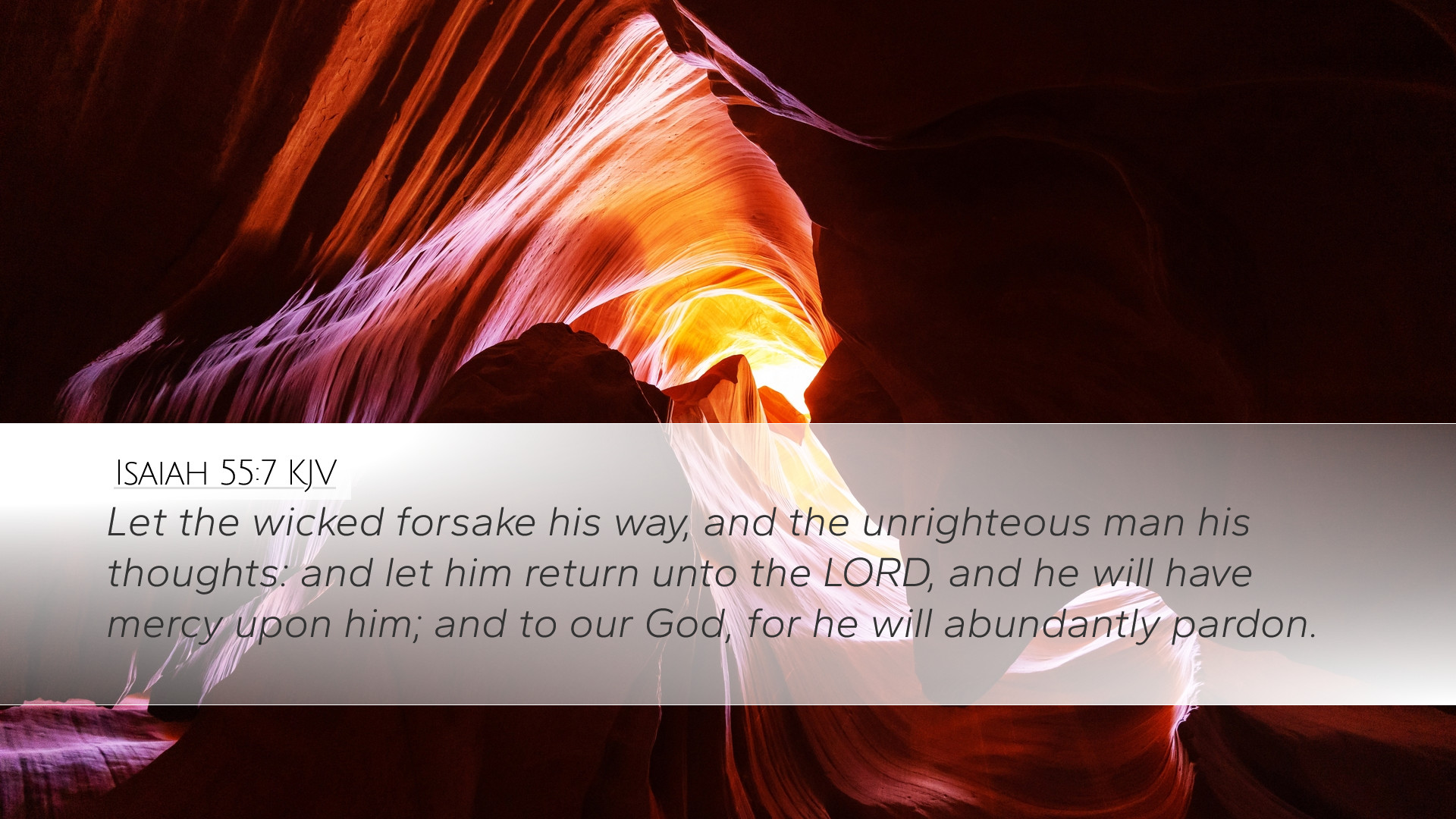Isaiah 55:7 - Commentary and Insights
Verse: "Let the wicked forsake his way, and the unrighteous man his thoughts: and let him return unto the Lord, and he will have mercy upon him; and to our God, for he will abundantly pardon."
Introduction
This verse from the book of Isaiah is a profound call to repentance and a declaration of God's boundless mercy. It invites both the wicked and the unrighteous to abandon their sinful ways and thoughts in order to receive divine forgiveness. This section seeks to delve into the rich theological and practical implications of this verse as gleaned from public domain commentaries by notable scholars.
The Call to Repentance
Matthew Henry's Perspective: Henry emphasizes the necessity of forsaking one's sinful ways. The term "forsake" indicates not merely a superficial change but a deep, intentional decision to turn away from sin. He suggests that the true nature of repentance is a change of heart that leads to a change of conduct.
Adam Clarke's Analysis: Clarke elaborates on the distinction between 'the wicked' and 'the unrighteous'. He explains that 'the wicked' may refer to those who blatantly disregard God’s laws, while 'the unrighteous' might include those who act unjustly or deceitfully. This call thus applies across a wide spectrum of immoral behavior, underscoring the universality of sin and the need for all to return to God.
The Nature of Divine Mercy
Albert Barnes' Interpretation: Barnes reflects on the character of God as one who is ready to forgive. He points out that God's mercy is not conditional upon the magnitude of one's sins but rather hinges on the sinner's heartfelt return to Him. Thus, the phrase "He will have mercy" speaks volumes about God's compassionate disposition toward those who repent.
Henry Comments on God's Abundant Pardon: Henry considers the phrase "abundantly pardon" as a significant assurance for those wrestling with guilt. He asserts that the mercy of God is not only sufficient but overflowing. This abundant pardon effectively parallels the depth of our transgressions, providing comfort to the believer that their repentance will not be met with scorn but with gracious acceptance.
The Role of Thoughts in Repentance
Insight from Clarke: The mention of 'unrighteous man his thoughts' highlights the importance of inner reflection. Clarke points out that actions are born from thoughts, and therefore, the call to forsake unrighteousness begins within. Genuine repentance requires a transformative change at the cognitive level, where one not only alters their behavior but also their mindset toward sin and holiness.
Deep Reflective Practice: Both Henry and Barnes stress that repentance must embody a shift in our thinking - moving from a self-centered viewpoint to one that honors God. This is not merely willpower but a work of the Holy Spirit that changes hearts and minds.
The Assurance of Return
Both Clarke and Barnes Emphasize Return: The invitation to 'return to the Lord' indicates that God is always poised to embrace those who turn back to Him, which reflects His unwavering faithfulness. This return is more than a physical act; it signifies a realignment of one’s life and relationship with God. God’s readiness to forgive sets the framework for healing and restoration.
Practical Implications for Believers
If we are to apply the teachings of this verse today, we find rich implications for both personal and communal life within faith contexts:
- Encouragement for the Struggling: Pastors can draw upon this verse to encourage individuals battling sin, reassuring them of God’s open arms.
- Call to Holiness: Isaiah’s message urges believers to examine both their actions and thoughts, encouraging a lifestyle that truly bears witness to a transformed character.
- Community of Forgiveness: Churches can adopt practices that reflect this theme of mercy and forgiveness, creating environments where repentance is met with grace.
Theological Reflections
The theological weight of Isaiah 55:7 speaks volumes about the nature of God, the human condition, and the process of salvation. By advocating for a return to God through repentance, it highlights the interplay between divine sovereignty and human responsibility:
- Human Initiative: The call to forsake sin demonstrates that individuals must consciously choose to turn away from their ways.
- Divine Grace: In contrast, God’s promise of mercy and pardon illustrates His boundless grace, assuring believers that their efforts to repent are met with divine forgiveness.
- Hope for All: The inclusivity of this call offers hope; no one is too far gone to seek and find forgiveness.
Conclusion
Isaiah 55:7 stands as a powerful reminder of the necessity and nature of repentance, the depth of God’s mercy, and the transformational change required in thoughts and actions. For pastors, students, and theologians alike, this verse calls for deeper reflection on personal practices of repentance and a commitment to embody the grace of forgiveness within their communities. As they meditate on these words, may they find both challenge and comfort in the unwavering promise of God's abundant pardon.


